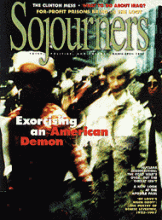Eight years after the ending of the Cold War, the Pentagon has finally abandoned Reagan-era plans for "prevailing" in a "protracted" nuclear war. That's the good news in a Presidential Decision Directive issued in November from the Clinton White House.
The bad news is that the United States continues to prepare for massive nuclear strikes against Russia, notwithstanding increasing bonds of friendship with Moscow, and has extended the role of nuclear weapons to permit their use against countries with nuclear, chemical, or biological weapons capability. The new policy perpetuates and expands the role of nuclear weapons as the cornerstone of American military policy. It means that the threat of nuclear war, which so many of us fervently hoped would be banished with the end of the Cold War, will continue to haunt us.
The implications of the new directive are frightening. In addition to targeting Russia's emerging democracy, the new directive reportedly envisions a wider array of potential targets in China. The directive also enlarges the scope of potential nuclear wrath to so-called "rogue states" in the developing world. For the first time Pentagon war planners are being instructed to prepare for possible nuclear strikes against nations with "prospective access" to atomic weapons. Under this scenario threshold nuclear countries such as North Korea or Iran, or even India and Pakistan, could be nuclear targets. (Would this also extend to the unmentionable nuclear power, Israel?)
Read the Full Article
